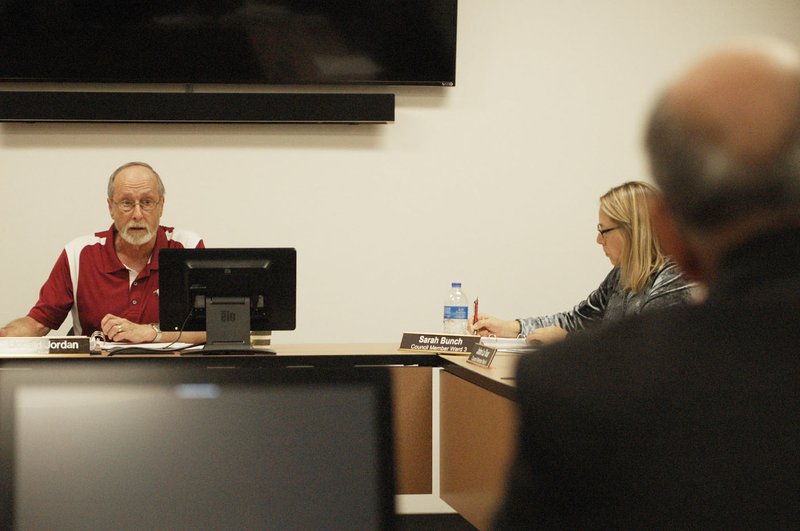FAYETTEVILLE -- The city will take a bare-bones approach to the coming year, refraining from adding programs or employee positions in order to accommodate the increasing costs of salaries, insurance and pensions.
The City Council on Saturday reviewed the proposed $160.8 million budget for 2018, up about $5.7 million from 2017's $155 million budget. The general fund takes up most of the budget with $45.6 million, which pays for essential city services such as police, fire, parks and the library. Water and sewer operations have a projected $39 million budget and the sales tax bond program, which pays the debt on previous projects, comes to nearly $22 million.
Fayetteville’s proposed budget
Sources of money
• Sales taxes: $62,952,900 (39.1 percent)
• Water sales: $19,656,460 (12.2 percent)
• Sewer service: $19,233,200 (12 percent)
• Charges for services: $17,696,100 (11 percent)
• Solid waste: $11,833,200 (7.4 percent)
• Intergovernmental: $10,495,230 (6.5 percent)
• Franchise taxes: $5,994,800 (3.7 percent)
• Other: $4,912,350 (3.1 percent)
• Property taxes: $4,865,000 (3 percent)
• Fines and forfeitures: $2,036,200 (1.3 percent)
• Transfers in: $2,011,000 (1.3 percent)
• Investments: $1,158,560 (0.7 percent)
• Fund balance: -$1,996,000 (-1.3 percent)
• Total: $160,849,000
Use of money
• Personnel services: $54,218,180 (33.8 percent)
• Debt service: $26,779,012 (16.6 percent)
• Services and charges: $21,576,792 (13.4 percent)
• Capital: $17,602,000 (10.9 percent)
• Wastewater treatment plant operations: $9,604,869 (6 percent)
• Purchased water: $7,500,00 (4.7 percent)
• Internal charges: $6,650,332 (4.1 percent)
• Material and supplies: $5,300,513 (3.3 percent)
• Maintenance: $5,063,933 (3.1 percent)
• Fuel: $4,542,369 (2.8 percent)
• Transfers out: $2,011,000 (1.3 percent)
• Total: $160,849,000
Source: City of Fayetteville
Those three aspects of the budget account for about 66 percent of the whole thing. The rest of the budget covers recycling and trash collection, vehicles and equipment, streets, parks development, the airport and more.
The city spends more on personnel than anything else. The 2018 budget has $54 million set aside for that purpose, from the prior year's $51 million budget. Personnel accounts for about 34 percent of all expenditures, the next closest thing being paying off debt. Debt expenses will go up about $3 million because the library expansion's bond issuance has kicked in.
The council will look at raises for employees in the spring, as it always does. Chief Financial Officer Paul Becker and Mayor Lioneld Jordan use projected sales tax growth to calculate the feasibility of ongoing salary increases.
Becker projected city sales tax revenue going into the general fund at the end of the year will go up 4 percent compared with 2016. County sales tax likely will be up nearly 7 percent. However, 2018's budget anticipates a 2 percent growth in overall sales tax revenue.
The approach is intentionally conservative. The estimated $28 million in sales tax revenue won't cover all of the estimated $36 million personnel cost anyway, and enough has to be left in the general fund reserve, about $7.5 million, to pay for 60 days' worth of expenditures. The city also keeps at least $3 million in a disaster fund in the event of major flooding or an ice storm.
The administration also has been trying to free up more space to pay police officers and firefighters more. A pay plan committee was formed this year to address the issue after a study found the city's police and fire pay rates lagged those of comparable agencies in and around the state.
Overall, the city is in good standing, Becker said. Property taxes are projected to go up about 7 percent next year, franchise fees for electrical, gas and internet services should go up about $20,000 and building permits should stay flat.
"We've got a pretty bare bones budget this year," Becker said. "No new personnel, no new programs. I think right now we're doing well."
As far as notable increases in spending, the city will spend about $1.4 million more on employees in 2018, $560,000 more on health insurance and an additional $154,000 in police and fire pensions. Those three make up 90 percent of the additional $2.5 million in overall general fund spending.
Another change from the previous year's budget includes about $600,000 taken out of the street overlay budget to put toward sidewalk improvements. About $980,000 will be set aside for sidewalks next year.
Transportation Director Terry Gulley said the city should repave about 25 miles of road per year to prevent rapid deterioration, but actually takes on about 12 miles. The price of asphalt keeps rising and streets need a new coating about every 15 years, he said.
Jordan said he wanted to make street maintenance a priority going forward. He advised the council to also keep an eye on the airport, which largely depends on federal money to make its repairs. A cultural arts corridor downtown, spearheaded by a nearly $1.8 million grant from the Walton Family Foundation announced Friday, also will be on the city's radar. Jordan also said he wanted to explore creating more mountain biking trails.
The council will vote on the budget Tuesday.
NW News on 11/19/2017

